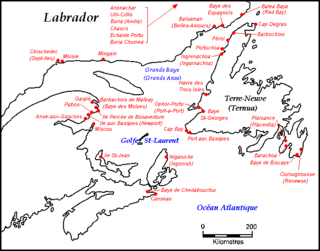Algonquian–Basque pidgin
Appearance
You can help expand this article with text translated from the corresponding article in Basque. (July 2014) Click [show] for important translation instructions.
|
| Algonquian–Basque pidgin | |
|---|---|
| Region | Gulf of Saint Lawrence |
| Era | 16th to 18th century |
Basque-based pidgin | |
| Language codes | |
| ISO 639-3 | None (mis) |
| Glottolog | basq1252 |
 Basque fishing sites (in French) | |
The Algonquian–Basque pidgin was a pidgin spoken by the Basque whalers and various Algonquian peoples.[1] It was spoken near the Saint Lawrence River. It was last attested in 1710.[1]
There were three groups of First Nations that the Basque people distinguished. The ones with which they had good relations were the Montagnais and the Iroquois. They also knew of the Inuit, whom they considered hostile. The Basque people referred to them as the Montaneses, the Canaleses and the Esquimoas, respectively.[2]
Sample words
| Pidgin | Original language | English translation |
|---|---|---|
| Normandia | Normandia (eu), 'Normandy' | French |
| kir | kir (mic) | you |
| ania | anaia (eu) | brother |
| capitana | capitaina (eu), kapitaina in Standard Basque | captain |
| endia | andia (eu), handia in Standard Basque | large |
| chave | chave (roa) | know |
References
- ^ a b Bakker, Peter (1989). ""The Language of the Coast Tribes is Half Basque": A Basque-American Indian Pidgin in Use between Europeans and Native Americans in North America, ca. 1540-ca. 1640". Anthropological Linguistics. 31 (3/4): 117–147. JSTOR 30027995.
- ^ Echoes from the Past
- ^ Gray, Edward (2000). The Language Encounter in the Americas, 1492-1800. Berghahn Books. p. 342. ISBN 9781571812100.
Categories:
- Algonquian languages
- Basque-based pidgins and creoles
- Basque diaspora
- Extinct languages of North America
- North America Native-based pidgins and creoles
- Languages attested from the 16th century
- 16th-century establishments in North America
- Languages extinct in the 18th century
- 18th-century disestablishments in North America
